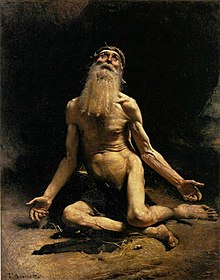Job’s View of God

Although the book of Job does not say how long Job suffered, the implications drawn from chapters 1 and 2 seem to reflect that Job suffered for a long time, probably more than one year. During this period of time, Job’s view about God changed.
When calamities struck his house, Job worshiped God. Job “tore his robe, shaved his head, and fell on the ground and worshiped. He said, ‘Naked I came from my mother’s womb, and naked shall I return there; the LORD gave, and the LORD has taken away; blessed be the name of the LORD’” (Job 1:20–21).
However, as his pain and suffering continued through the weeks and months, Job began to doubt God’s justice and God’s fairness. Job believed that God used evil people to torment him, “God gives me up to the ungodly, and casts me into the hands of the wicked” (Job 16:11). Job believed that God expressed his anger against him by the hands of evildoers, “[God’s] anger tears at me, and he harasses me” (Job 16:9).
Job is not only suggesting that God allows the wicked to torment him; Job believed that God uses them to cause him harm and to bring him all the calamities that destroyed his family and became the reason for his suffering, “he set me up as his target; his archers surround me” (Job 16:12–13).
Job’s view of God, however, was in contrast to what God had said about Job in the prologue. Job was unaware of what had happened in the divine council (chapters 1 and 2). God’s and Satan’s views of Job differ, but their views about Job help us understand Job’s view of God. To understand Job’s view of God, one must know what God thought of Job.
God’s View of Job
God’s view of Job is reported twice in the book. In the first meeting between God and Satan, God offered his view of Job, “ The LORD said to Satan, ‘Have you considered my servant Job? There is no one like him on the earth, a blameless and upright man who fears God and turns away from evil” (Job 1:8).
In his second meeting with Job, God again expressed his view of Job, “The LORD said to Satan, ‘Have you considered my servant Job? There is no one like him on the earth, a blameless and upright man who fears God and turns away from evil. He still persists in his integrity, although you incited me against him, to destroy him for no reason” (Job 2:3).
The expression “blameless” in Hebrew is tām. The word means “perfect.” God is declaring that Job is a man of integrity, a man whose integrity is exemplary. Job is also an “upright man,” a man who practices the ethical norms of behavior. Because Job “turns away from evil,” God had full confidence that Job could survive whatever adversity Satan would bring upon Job.
Satan’s View of Job
When Satan was told about Job’s character, he strongly disagreed with God’s assessment of Job because he believed the only reason Job served God was because God was protecting him. In his first statement to God, Satan said, “Does Job fear God for nothing? Have you not put a fence around him and his house and all that he has, on every side? You have blessed the work of his hands, and his possessions have increased in the land. But stretch out your hand now, and touch all that he has, and he will curse you to your face” (Job 1:9–11).
Satan believed that Job had good reasons to fear God. Job only served God because of what God was doing for him. God had put a hedge of protection around Job, his home, and his property. God had made him prosper in everything he did. Satan believed that if Job was poor and destitute of everything he had, he would deny God. Satan said to God, “reach out and take away everything he has, and he will surely curse you to your face” (Job 1:11).
In his second meeting with God, after Job had suffered the loss of everything he possessed, Satan said to God, “Skin for skin! All that people have they will give to save their lives. But stretch out your hand now and touch his bone and his flesh, and he will curse you to your face” (Job 2:4–5).
This dialogue between God and Satan is the key to understanding Job’s suffering and why God allowed Satan to afflict Job. Satan could not deny that Job was a man of integrity and a man who feared God. What Satan questions is the reason Job fears God. Satan said, it is not “for nothing” that Job serves God. According to Satan, Job feared God only because he knew that God would give him a reward: wealth, a large family, and good health.
The Divine Permission
Because Satan was challenging Job’s sincere faith and worship of God, God allowed Satan to test Job’s faith. The test Job would face was whether Job feared God because of his prosperity or because he was a true believer, a man whose faith was not based on material prosperity.
In Job’s first trial, God said to Satan, “Very well, all that he has is in your power; only do not stretch out your hand against him” (Job 1:12). In the second trial, God said to Satan, “Very well, he is in your power; only spare his life” (Job 2:6).
God knew Job and trusted him. God allowed Satan to test Job in order to vindicate Job against the insinuations of Satan. God had confidence in Job, but in a sense, God needed to know whether the outcome would confirm his assessment of Job’s faith. Job had a free will to make decisions: would Job curse God when confronted with pain and suffering or would Job remain faithful to God in the midst of his afflictions?
Job’s View of God
Readers of the book of Job, unlike Job’s three friends, know the prologue to the book and also know that Job was a man who feared God and a man of integrity. This fact about Job is the opposite of what Job’s three friends believed about him. Job’s problem, however, was why he had lost everything and why he was suffering so much.
Job could not understand the reason for his suffering. Since Job believed that God was the creator of all things, Job concluded that God was wrong this time. Job believed that he was the incorrect target of God’s anger, and Job just wanted to know why God was punishing him.
Job’s anger, his frustration about God’s motive, and his confusion about God’s failure to answer his prayer and his many requests for an explanation for his suffering, made Job question God’s goodness and God’s justice. In his pain, Job speaks harsh words about God, the God whom he believed had turned from being his protector to being his enemy.
Job said, “For the Almighty has struck me down with his arrows. Their poison infects my spirit. God’s terrors are lined up against me” (Job 6:4). This is the first time Job accused God of being the source of his suffering. Job, however, did not know what had happened in heaven, thus, what he says about God does not reflect what kind of God God had been to him.
Job said, “O God, you have ground me down and devastated my family. As if to prove I have sinned, you have reduced me to skin and bones” (Job 16:7–8). Job believed that God had devastated his family, that is, that he had killed his children and his servants. God had punished him so severely that his friends believed that his suffering was a sign of divine punishment. His broken body was the evidence of his sin. Job’s emaciated body, which was caused by God’s hand, served as proof to all people, except Job, that Job was a great sinner before God.
Job said, “He has torn me in his wrath, and hated me; he has gnashed his teeth at me; my adversary sharpens his eyes against me” (Job 16:9). Because of his brutal treatment at the hands of God, Job believed that God had attacked him like a wild beast that was tearing him apart with its gnashed teeth. Job believed that God hated him and that he, angry at him, was tearing him apart. Job said, “my adversary sharpens his eyes against me.” The Hebrew word for “adversary” has the same meaning as the Hebrew word for śātān.
In his explanation on why Job called God his adversary, John Hartley writes, “Unable to fathom God’s role in his affliction, Job fears that God has become his enemy. Here Job comes close to reconstructing the scenes of the heavenly counsel in the prologue, but he turns them inside out. He identifies God as his enemy rather than as his advocate. At this crucial point he is tested to the ultimate. From his perspective he is led to wonder if the God in whom he has trusted is not in reality his satan” (Hartley 1988:260).
Job’s views of God came out of his struggle with his losses and his illness. In his dialogue with his friends, Job calls God his adversary (Job 16:9), the enemy archer (Job 6:4), the divine crusher (Job 9:17), the divine oppressor (Job 10:3), and the destroyer of the blameless and of the wicked (Job 9:22).
Since Job believed that God was his enemy, Job needed a mediator, “I need someone to mediate between God and me, as a person mediates between friends” (Job 16:21 NLT). Job believed he had no chance of being declared not guilty, “how can a person be declared innocent in God’s sight? If someone wanted to take God to court, would it be possible to answer him even once in a thousand times? Who has ever challenged him successfully?” (Job 9:2–4 NLT)
Job recognized the difficulty of arguing with God, “So who am I, that I should try to answer God or even reason with him?” (Job 9:14 NLT). But Job felt that he must present his case to God, “Let me complain freely. My bitter soul must complain. I will say to God, ‘Don’t simply condemn me — tell me the charge you are bringing against me” (Job 10:1–2 NLT).
In his summary of how Job viewed God, Clines writes, “Job turns toward God, chiding God for walling up, stripping, breaking down, uprooting, kindling wrath, and assaulting—powerful verbs and images that describe the activity of God as nothing less than cruel and vicious (19:8–12). As a result of God’s aggression, Job’s life is repulsive and pointless, characterized by foul breath, loss of family, shocking physical appearance” (Clines 659).”
Job’s Acknowledgment of His False Evaluation of God
After God revealed himself to Job and described his work in maintaining his creation, Job acknowledged that he had spoken wrongly about God. Job said, “I know that you can do all things, and that no purpose of yours can be thwarted. Who is this that hides counsel without knowledge? Therefore I have uttered what I did not understand, things too wonderful for me, which I did not know. Hear, and I will speak; I will question you, and you declare to me. I had heard of you by the hearing of the ear, but now my eye sees you; therefore I despise myself, and repent in dust and ashes” (Job 42:1–6).
Job confessed that he had heard about God through the traditions transmitted by the religious leaders of his nation. What Job had learned about God, Job faithfully lived by what he was taught. But his knowledge of God was second-hand knowledge. Things changed when Job had a personal encounter with God.
That personal encounter with God changed Job’s life, “I had heard of you by the hearing of the ear, but now my eye sees you.” Now Job realized what kind of God his God was. God was nothing like the God Job spoke of while he was confronting his friends. God was different and Job realized that God was not like a cruel God who was punishing him. When Job discovered what kind of God God was, Job said, “I had heard of you by the hearing of the ear, but now my eye sees you.
Conclusion
When people are suffering, when they are hurting, and when they have lost their possessions or a loved one, they look for answers, they look for the cause of their loss or the cause for their suffering. Many times, they find no answer. The problem of human suffering is a reality in the broken world in which we live.
Most human suffering is shrouded in mystery. Seldom are people able to discover the reason for their suffering. Most often, the reason for pain and suffering, for calamities and tragedies of life will never be known; they will be hidden among the many mysteries that are part of human existence.
When that occurs, the human tendency is to blame God. When people are confronted with existential mysteries, people say that God is cruel, that he is unfair, that he is an enemy, that he is a savage God.
When the prophet Elisha confronted two men who had doubts about God, Elisha prayed, “‘O LORD, open the eyes of these men so that they may see.’ The LORD opened their eyes, and they saw” (2 Kings 6:20).
Job’s eyes were closed by the religious teaching he had received. Job believed in the doctrine of retribution, but he realized that his encounter with God negated the truth of that teaching. When Job met the Lord, and the Lord spoke to Job, Job’s eyes were opened. Job said, “now my eye sees you.”
When Job’s eyes were opened, he saw God, a God who was different from the God he thought he knew. Job realized that God was greater and yet stranger than he thought. Job discovered that God was unique but mysterious. The God Job saw was a God worthy of worship and praise. Job discovered a God who honored his faithfulness even when Job approached him with painful, but honest words.
For all nine lessons on this series, visit my post on Studies on the Book of Job.
Note: For other studies on the Book of Job and the problem of suffering, read my post, An Introduction to the Book of Job.
NEXT: LESSON 8 – “The Speeches of Yahweh and the Reaction of Job.”
BIBLIOGRAPHY
Clines, David J. A. Job 1–20. Word Biblical Commentary. Dallas: Word Publisher, 1989.
Hartley, John E. The Book of Job. Grand Rapids: Eerdmans, 1988.
Claude Mariottini
Emeritus Professor of Old Testament
Northern Baptist Seminary
NOTE: Did you like this post? Do you think other people would like to read this post? Be sure to share this post on Facebook and share a link on Twitter or Tumblr so that others may enjoy reading it too!
I would love to hear from you! Let me know what you thought of this post by leaving a comment below. Be sure to like my page on Facebook, follow me on Twitter, follow me on Tumblr, Facebook, and subscribe to my blog to receive each post by email.
If you are looking for other series of studies on the Old Testament, visit the Archive section and you will find many studies that deal with a variety of topics.








